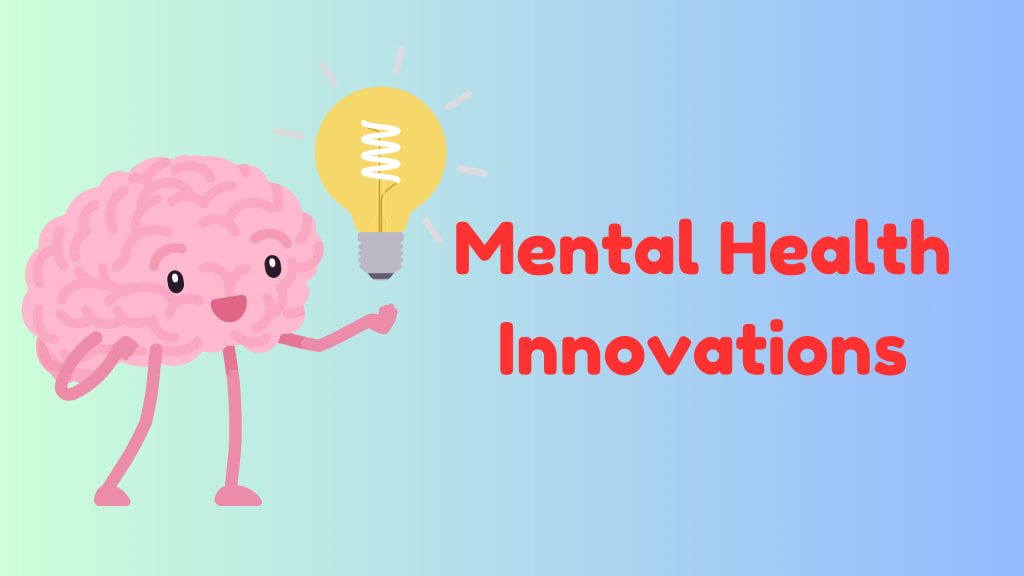Mental Health Innovations
Transforming Care and Well-Being in the 21st Century

Mental health has increasingly become a critical global concern, highlighted by the pressures of modern life and exacerbated by the COVID-19 pandemic. The urgent need for effective mental health care solutions has spurred numerous innovations, ranging from technological breakthroughs to novel therapeutic approaches. These advancements aim to make mental health care more accessible, personalized, and effective. This article explores key innovations in mental health, their impacts, challenges, and future prospects.

The Digital Revolution in Mental Health Care
Teletherapy and Telepsychiatry
One of the most significant shifts in mental health care delivery has been the rise of teletherapy and telepsychiatry. Telehealth platforms have made it possible for patients to access therapy and psychiatric services remotely, breaking down barriers such as geographical distance and mobility issues. Platforms like Talkspace, BetterHelp, and Teladoc have gained popularity, providing on-demand therapy sessions via video calls, chat, or phone (SIEPR) (HBS Working Knowledge).
Teletherapy has proven particularly beneficial during the COVID-19 pandemic, ensuring continuity of care while maintaining social distancing. Research indicates that teletherapy is as effective as in-person therapy for many conditions, including depression, anxiety, and PTSD (SIEPR). Additionally, telepsychiatry allows for remote diagnosis and prescription management, increasing access to psychiatric care for underserved populations.
Mental Health Apps
Mobile apps have emerged as valuable tools for mental health support, offering resources for self-care, mood tracking, meditation, and therapy. Apps like Headspace, Calm, and Moodpath provide guided meditations, stress management techniques, and cognitive-behavioral therapy (CBT) exercises. These apps empower users to take charge of their mental health, providing tools for managing stress, anxiety, and depression on a daily basis (SIEPR) (HBS Working Knowledge).
Some apps, like Woebot and Wysa, use artificial intelligence to offer interactive mental health support. These AI-driven chatbots provide real-time conversations, guiding users through evidence-based therapeutic exercises and offering emotional support. While not a replacement for professional therapy, these apps can serve as supplementary resources, particularly for those who may not have immediate access to mental health services (HBS Working Knowledge).

Technological Advancements
Telepsychiatry
One of the most transformative innovations in mental health is telepsychiatry. This technology leverages video conferencing to provide psychiatric assessment and care remotely. It has been particularly beneficial in expanding access to mental health services for individuals in rural or underserved areas. During the COVID-19 pandemic, telepsychiatry became a lifeline for many, allowing continuous care despite social distancing measures. Studies have shown that telepsychiatry is as effective as in-person consultations for various mental health conditions, making it a valuable tool for the future of mental health care.
Mobile Health Applications
Mobile health applications, or mHealth apps, have revolutionized the way individuals manage their mental health. These apps offer various functionalities, including mood tracking, guided meditation, cognitive-behavioral therapy (CBT) exercises, and crisis intervention resources. Popular apps like Headspace, Calm, and Moodpath have empowered users to take control of their mental well-being. Research indicates that these apps can reduce symptoms of anxiety and depression, making mental health support more accessible and user-friendly.
Artificial Intelligence and Machine Learning
Artificial intelligence (AI) and machine learning (ML) have made significant inroads into mental health diagnostics and treatment. AI algorithms can analyze vast amounts of data from electronic health records, social media activity, and wearable devices to identify patterns indicative of mental health conditions. For instance, AI can predict the onset of depressive episodes or suicidal ideation by analyzing changes in a person's online behavior. Additionally, AI-powered chatbots like Woebot provide real-time mental health support, offering evidence-based therapeutic techniques and emotional assistance.

Therapeutic Innovations
Personalized Medicine
Personalized medicine, or precision psychiatry, tailors treatment plans to an individual's genetic, environmental, and lifestyle factors. This approach contrasts with the traditional one-size-fits-all model of mental health treatment. Advances in genomics have enabled the identification of genetic markers associated with mental health conditions, allowing for more targeted interventions. Pharmacogenomics, a subset of personalized medicine, examines how an individual's genetic makeup affects their response to medications, helping clinicians prescribe the most effective drugs with the fewest side effects.
Psychedelic-Assisted Therapy
Psychedelic-assisted therapy has emerged as a promising treatment for various mental health conditions, including depression, PTSD, and anxiety. Substances like psilocybin (found in magic mushrooms), MDMA (commonly known as ecstasy), and ketamine are being studied for their therapeutic potential. Clinical trials have shown that these substances, when administered in controlled settings and combined with psychotherapy, can produce profound and lasting improvements in mental health. The FDA has granted "breakthrough therapy" status to several psychedelic compounds, expediting their path to potential approval.
Digital Therapeutics
Digital therapeutics are evidence-based interventions delivered through digital platforms like apps, wearables, and virtual reality. These interventions can provide therapeutic exercises, psychoeducation, and skill-building activities to help individuals manage their mental health. Pear Therapeutics' reSET-O, a digital therapeutic for opioid use disorder, and Akili Interactive's EndeavorRx, a digital treatment for ADHD, are examples of how digital therapeutics are transforming mental health care. These innovations offer scalable and cost-effective solutions, complementing traditional therapeutic approaches.

Policy and Systemic Innovations
Mental Health Parity Laws
Mental health parity laws aim to ensure that mental health and substance use disorder treatments are covered by insurance to the same extent as physical health treatments. The Mental Health Parity and Addiction Equity Act (MHPAEA) of 2008 in the United States marked a significant milestone in this regard. It prohibits discriminatory practices by insurers, such as higher co-pays or more restrictive limits on mental health benefits compared to medical and surgical benefits. Such policies are crucial for reducing financial barriers to accessing mental health care.
Integration of Mental Health into Primary Care
Integrating mental health services into primary care settings is an innovative approach to addressing mental health needs more holistically. Primary care providers are often the first point of contact for individuals with mental health concerns. Integrating mental health services into these settings ensures that mental health conditions are identified and treated early. Collaborative care models, where primary care providers work alongside mental health specialists, have shown improved outcomes for patients with depression and anxiety.
Community-Based Mental Health Programs
Community-based mental health programs focus on providing support within the community rather than in institutional settings. These programs leverage the strengths and resources of the community to promote mental health and well-being. Peer support groups, community mental health centers, and mobile crisis units are examples of community-based interventions. These programs can reduce stigma, enhance social support, and provide timely assistance to individuals in crisis, fostering a more inclusive approach to mental health care.

Research and Education Innovations
Neuroscience and Brain Imaging
Advances in neuroscience and brain imaging have deepened our understanding of the biological underpinnings of mental health conditions. Techniques like functional magnetic resonance imaging (fMRI) and positron emission tomography (PET) scans allow researchers to observe brain activity and identify abnormalities associated with mental health disorders. This knowledge is critical for developing more effective treatments and preventive strategies. For example, brain imaging studies have revealed how depression affects brain circuits involved in mood regulation, guiding the development of targeted therapies.
Mental Health Literacy and Education
Improving mental health literacy and education is essential for reducing stigma and promoting early intervention. Innovative educational programs and campaigns aim to increase public awareness and understanding of mental health issues. Schools, workplaces, and community organizations are incorporating mental health education into their curricula and programs. Initiatives like Mental Health First Aid (MHFA) train individuals to recognize and respond to mental health crises, equipping communities with the skills to provide initial support.
Online Learning and Training Platforms
Online learning and training platforms have made mental health education more accessible and flexible. These platforms offer courses on various aspects of mental health, from understanding specific conditions to developing therapeutic skills. Mental health professionals can benefit from continuous education and professional development, while the general public can enhance their knowledge and skills in supporting mental health. Platforms like Coursera, edX, and Udemy offer a wide range of mental health courses, making high-quality education available to a global audience.

Future Directions and Challenges
Addressing Inequities in Mental Health Care
Despite significant advancements, disparities in mental health care access and outcomes persist. Socioeconomic status, race, ethnicity, and geographic location can all influence an individual's ability to access quality mental health care. Addressing these inequities requires targeted policies, community engagement, and culturally competent care. Innovative solutions, such as telepsychiatry and mobile health apps, can help bridge some of these gaps, but systemic changes are also necessary to ensure equitable mental health care for all.
Balancing Technology and Human Touch
While technology offers many benefits, it is essential to balance technological innovations with the human touch that is central to mental health care. Building trust, empathy, and rapport between patients and providers remains crucial. Ensuring that technological interventions complement rather than replace human interaction is vital for maintaining the quality of care. Training mental health professionals to integrate technology into their practice effectively and ethically is an ongoing challenge that requires careful consideration.
Promoting Global Mental Health
Mental health is a global issue that requires coordinated efforts across countries and cultures. International organizations like the World Health Organization (WHO) play a critical role in setting standards, conducting research, and providing guidance on best practices. Innovations in mental health must be adaptable to different cultural contexts and address the unique challenges faced by low- and middle-income countries. Strengthening global mental health initiatives, fostering international collaboration, and sharing knowledge and resources are essential for improving mental health worldwide.

Ethical Considerations and Data Privacy
As mental health innovations increasingly rely on data collection and analysis, ethical considerations and data privacy become paramount. Ensuring that individuals' sensitive mental health data is protected from misuse and breaches is critical. Transparent data governance, informed consent, and robust cybersecurity measures are necessary to maintain trust in digital mental health interventions. Additionally, ethical considerations around AI and machine learning, such as algorithmic bias and transparency, must be addressed to ensure fair and equitable outcomes.
Adoption by Healthcare Systems
For mental health innovations to be effective, they must be integrated into everyday practice within healthcare systems. This requires a concerted effort from policymakers, healthcare providers, and other stakeholders. Policies that encourage the adoption of telepsychiatry, mobile health applications, and digital therapeutics can facilitate their widespread use. Additionally, healthcare systems need to invest in training programs to ensure that mental health professionals are proficient in using these new technologies and approaches.
Training and Professional Development
Continuous training and professional development are essential for mental health professionals to stay updated with the latest innovations. Educational institutions and professional organizations should incorporate training on new technologies and therapeutic approaches into their curricula and continuing education programs. This will equip mental health professionals with the knowledge and skills needed to provide the best possible care to their patients.

Interdisciplinary Collaboration
Interdisciplinary collaboration is crucial for the successful implementation of mental health innovations. Psychiatrists, psychologists, social workers, primary care physicians, and other healthcare professionals must work together to provide comprehensive care. Collaborative care models, where mental health professionals work alongside primary care providers, have proven effective in improving patient outcomes. Such models ensure that mental health conditions are identified and treated early, reducing the burden on specialized mental health services.
Patient and Community Engagement
Engaging patients and communities in the development and implementation of mental health innovations is vital. Patients' perspectives and experiences can provide valuable insights into the effectiveness and usability of new interventions. Community engagement ensures that mental health services are culturally appropriate and address the specific needs of different populations. By involving patients and communities in the innovation process, we can create more effective and inclusive mental health solutions.

The Role of Research and Development
Ongoing Research and Clinical Trials
Ongoing research and clinical trials are essential for evaluating the efficacy and safety of new mental health interventions. Randomized controlled trials, longitudinal studies, and real-world evidence are critical for understanding the impact of innovations on patient outcomes. Research institutions, pharmaceutical companies, and government agencies must continue to invest in mental health research to identify new treatments and refine existing ones.
Translational Research
Translational research bridges the gap between basic scientific discoveries and clinical practice. In mental health, this means translating findings from neuroscience, genetics, and psychology into practical interventions that can be used in clinical settings. By fostering collaboration between researchers and clinicians, translational research ensures that scientific advancements are rapidly and effectively incorporated into mental health care.
Dissemination of Knowledge
The dissemination of knowledge is crucial for the widespread adoption of mental health innovations. Journals, conferences, and professional organizations play a key role in sharing new research findings and best practices. Additionally, open-access publications and online platforms can make knowledge more accessible to a global audience. Ensuring that mental health professionals have access to the latest research and evidence-based practices is essential for improving patient care.
Future Perspectives
Emerging Technologies
Emerging technologies such as virtual reality (VR), augmented reality (AR), and wearable devices hold great promise for the future of mental health care. VR and AR can be used to create immersive therapeutic environments for exposure therapy, mindfulness training, and stress reduction. Wearable devices can continuously monitor physiological and behavioral indicators, providing real-time data for personalized interventions. As these technologies become more advanced and affordable, they will play an increasingly important role in mental health care.
Precision Psychiatry
Precision psychiatry aims to tailor mental health treatments to individual patients based on their unique genetic, biological, and environmental profiles. Advances in genomics, neuroimaging, and data analytics are paving the way for more precise diagnoses and targeted treatments. By identifying specific biomarkers and genetic variants associated with mental health conditions, precision psychiatry can improve treatment outcomes and reduce the trial-and-error approach often associated with psychiatric medications.

Global Mental Health Initiatives
Global mental health initiatives are essential for addressing the mental health needs of populations worldwide. The World Health Organization (WHO) and other international organizations are working to improve mental health care in low- and middle-income countries through initiatives like the Mental Health Gap Action Programme (mhGAP). These initiatives focus on training healthcare providers, increasing access to mental health services, and reducing stigma. By promoting global collaboration and sharing best practices, we can improve mental health outcomes on a global scale.

Ethical and Societal Considerations
As we embrace mental health innovations, it is important to consider the ethical and societal implications. Issues such as data privacy, informed consent, and the potential for algorithmic bias must be carefully addressed. Ensuring that mental health interventions are equitable and accessible to all individuals, regardless of their socioeconomic status or geographic location, is crucial. Additionally, promoting mental health literacy and reducing stigma remain important societal goals.
Conclusion
The landscape of mental health care is rapidly evolving, driven by technological advancements, therapeutic innovations, and policy reforms. Telepsychiatry, mobile health applications, personalized medicine, and psychedelic-assisted therapy are just a few examples of the groundbreaking innovations transforming mental health care. Integrating these innovations into everyday practice, fostering interdisciplinary collaboration, and engaging patients and communities are essential for maximizing their impact.
Ongoing research and development, along with the dissemination of knowledge, will continue to drive progress in mental health care. Emerging technologies and precision psychiatry hold great promise for the future, offering more targeted and effective interventions. Global mental health initiatives and ethical considerations will ensure that these advancements benefit individuals worldwide.
As we look to the future, it is crucial to continue investing in mental health innovations and addressing the challenges and ethical considerations that arise. By doing so, we can build a future where mental health care is accessible, equitable, and effective for all, improving the well-being of individuals and communities around the world.
This comprehensive article on mental health innovations provides a detailed overview of the major advancements and their impact. It highlights the importance of integrating these innovations into everyday practice, ongoing research and development, and addressing ethical considerations to ensure a better future for mental health care.
About the Creator
Raja Trends
Here, my friends get important updates and interesting stories to catch everything you will need. To get important article notifications and updates. Please Subscribe to Motivate me to Upload High-Quality content and articles.
Enjoyed the story? Support the Creator.
Subscribe for free to receive all their stories in your feed. You could also pledge your support or give them a one-off tip, letting them know you appreciate their work.






Comments
There are no comments for this story
Be the first to respond and start the conversation.